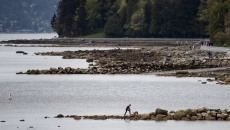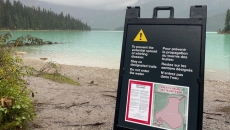Parks Canada wants everyone to know that despite the wildfire scorching Jasper National Park, Bear 222 is OK.
"She looks like a very healthy grizzly bear right now," the federal agency said on a social media thread. The bear, fitted with a radio tracking collar, has been followed since the blaze began last week.
"Grizzly Bear 222 and her two cubs tucked themselves into a wet spot by the Athabasca River."
Despite the loss of about a third of the Jasper townsite, including homes and buildings, as well as the sorrow over the destruction of a beloved piece of Canadian landscape, experts say animals know how to protect themselves in a wildfire.
This morning, we welcomed over 200 South African firefighters and support staff at the Edmonton International Airport. We’d like to thank them for their help as we fight fires across the province. pic.twitter.com/aK5CFVznlO
— Alberta Wildfire (@AlbertaWildfire) July 29, 2024
"Fire is a natural process and we expect animals to find new places to live," said James McCormick, Jasper's human-wildlife coexistence specialist.
Mark Boyce, a wildlife biologist at the University of Alberta, said Jasper's animals know what to do when their home is on fire.
"Most of the critters get out of the way," he said.
"The number of animals (killed) is usually pretty small. In general, it's not a major source of mortality."
Last week the community of Jasper, AB was impacted by wildfire. On July 24 we deployed a task force of 17 staff to support @JasperNP, the municipality of Jasper and other partners on the ground. Our hearts go out to our firefighting colleagues and all those affected by this fire. pic.twitter.com/2mrzYicU6V
— BC Wildfire Service (@BCGovFireInfo) July 30, 2024
Boyce helped on a study that looked at the effects of the 1998 wildfire in Yellowstone National Park in the U.S., which burned about a third of the park. It found that of that park's 17,000 elk, only about 350 died in the blaze.
"That's a pretty small fraction," he said.
A 2023 paper in the journal Conservation listed how animals react to fire.
Large animals can simply run for it. Smaller animals tend to hide underground or in sheltered places within the burn, such as tunnels, stumps, root holes, pathways under moist forest litter and spaces under rocks.
Birds can fly away, although some may be affected by smoke inhalation. Fleeing the flames also stresses animals, the paper says.
"Typically, the most affected are the slower-moving species, like turtles, badgers, and elderly and very young animals who are unable to escape. Moreover, as wildfires often occur in late spring or summer, stress also delays the recovery and reproduction of the population."
However, Boyce said that once the flames die down, burned-over land means salad days for many species, who feast on the tender green shoots of a regenerating forest.
"That regrowth is very attractive," he said.
"Bears, elk, moose, deer all really thrive. These fires are highly beneficial in the medium term."
There will be some grim months, said Boyce.
"It will be a couple years before it's green and lush again. But not very long.
"The ecosystem has not suffered. The park is doing just fine."
Much like Bear 222.
"She has been eating a mix of berries and clover on the edge of the Jasper Park Lodge golf course," Parks Canada says.
Fire officials said Monday that fires within the Jasper townsite are out, although the fire continues to rage elsewhere in the park.
Highways through the park remain closed. Federal Environment Minister Steven Guilbeault said a staged re-entry plan is being developed for the town's 5,000 permanent residents as well as its thousands of seasonal workers, although he said there's no timeline for it.
The fire could last for months, officials said.






